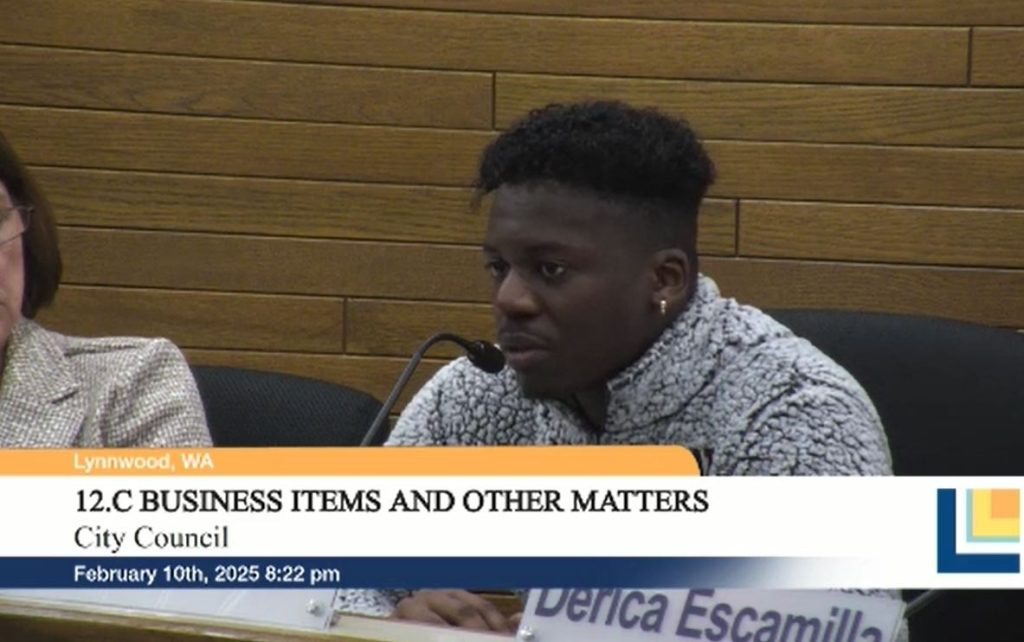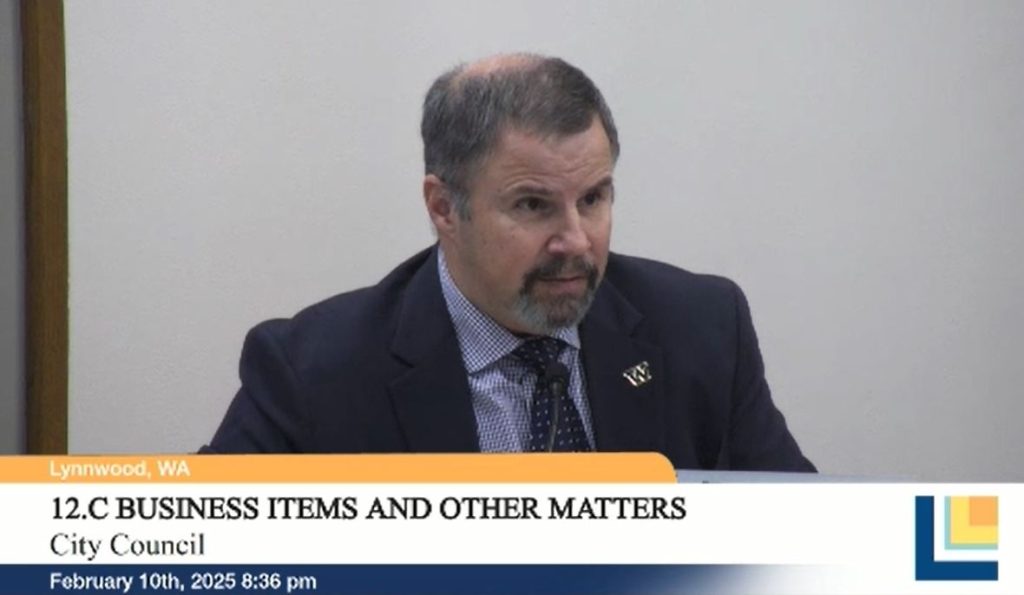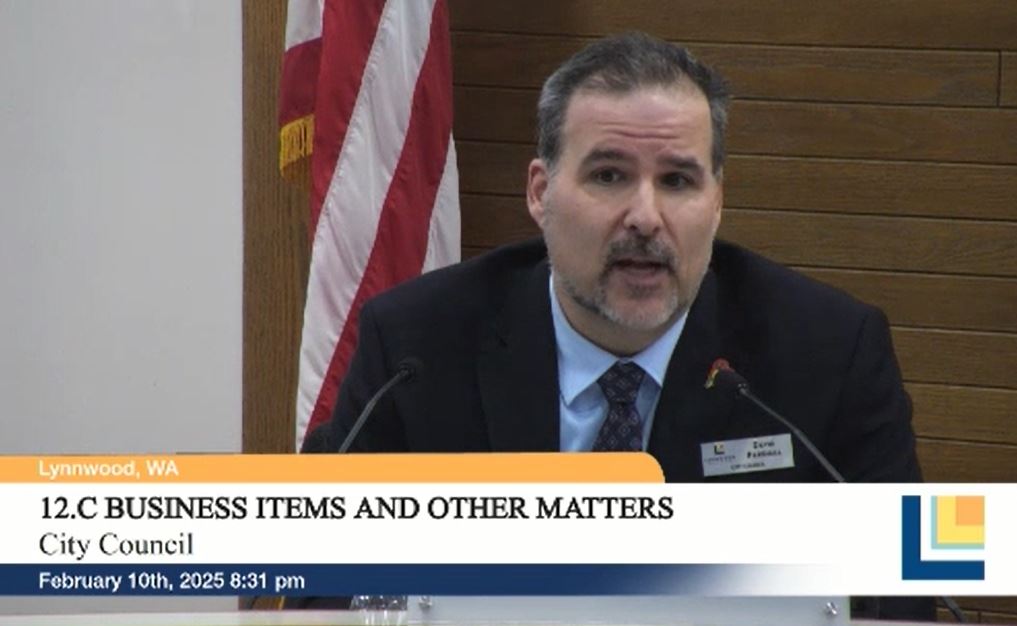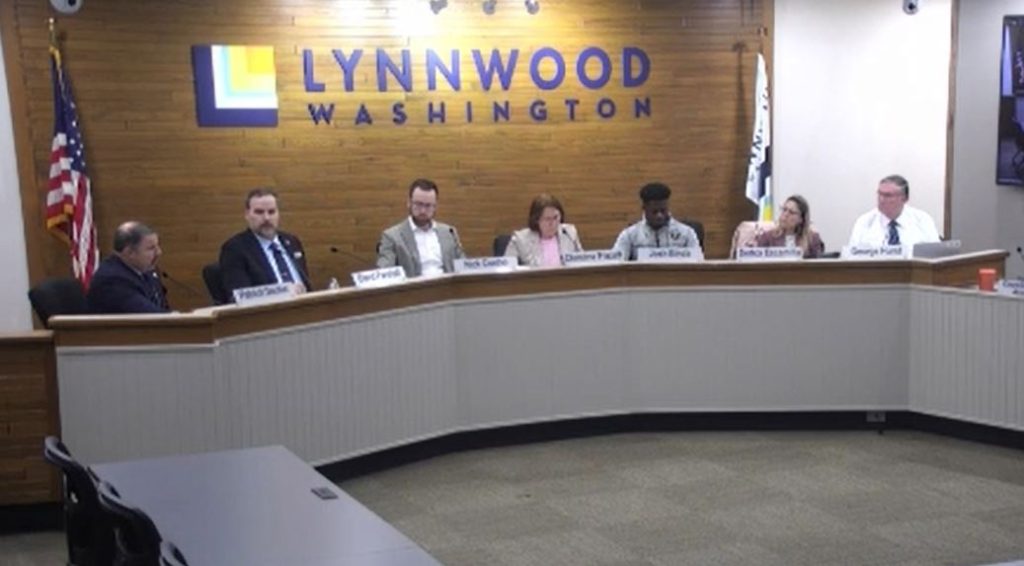LYNNWOOD—Lynnwood City Council Vice President Joshua Binda broke his silence surrounding allegations made that he has been living in Everett during council’s meeting Monday, February 10, claiming that he had simply been housesitting for his father while he was out of the country tending to his ailing mother in Liberia. Council Vice President Binda’s grandmother passed away recently, and the Lynnwood Times offers him and his family our deepest condolences.

“In 2023 I had lost my job and was forced to vacate the house that I was living in as I could no longer afford it and during that time I had to rely on my family during that tough time,” said Binda. “Yet despite those hardships I remain steadfast in my commitment to serve my community, fulfilling my council duties, and advocating for all of our collective needs.”
Binda did not provide an address in Lynnwood where he resides on Monday. The Lynnwood address that he is using for his voter registration still remains “inactive” and not been verified by the Snohomish County Auditor’s Office.
Binda further explained Monday that the different addresses he used as “his residence” were “not [he] saying [he] live[d] there,” but addresses that he wanted his mail to go to (the Everett address) and addresses where his family is (in Lynnwood – in regards to the Protection Order), despite the documents asking where he lives under threat of perjury. He also explained that he used several different addresses for his own protection.

“When you fill out a form, if it allows for a mailing address it will say mailing address. If it does not say mailing address on an official form, then it is your address. Address is where you live,” said Council member Patrick Decker in reference to Binda using an Everett address in his FEC filing. “Pretending this to mean mailing address, you can just make up any address you want when filing an FEC is ridiculous. That would mean that anyone could put any address they want, anywhere in the world and that would be in their filing. The reason these forms require address is so individuals know that you live within the boundaries of the office in which you’re going to be elected. That’s why it asks for an address and not a mailing address.”
Council member David Parshall brought up the point that there seems to be a gap between Binda’s 2023 eviction and housesitting for his father in 2025. A gap he suggested could possibly be resolved by involving the courts.
“There is confusion, and this is about trust between the council and the community,” said Parshall. “I was hoping for clarification tonight. I was hoping for a stronger statement than what I got from council leadership. I was hoping that council member Binda would come out and have stronger evidence about continual residency…The only way we can remove a council member is by resignation or the court systems, which I think could be an opportunity for council member Binda to clear himself if he wanted to go that route…I think the public wants to know what happened from eviction to today and I think that’s a reasonable question for the public to ask.”

Council member George Hurst asked Council Vice President directly whether he lived in Lynnwood or no; Binda insisted that yes, he does.
Council President Nick Coelho came to Vice President Binda’s defense Monday citing a series of statues concerning residency requirements and legally registered voter status.
“I informed the Mayor of my intent to potentially seek legal counsel on this because it’s a little over my head. Just to confirm everything she proactively arranged a meeting with our City Attorney who, to my knowledge, confirmed that my logic was pretty sound and there was no legal case to be made,” said Coelho. “This, for now, appears to be a political problem masquerading as a legal problem. I believe that I have done my due diligence on this topic… I urge my colleague to clarify details to our constituents in the near future and for concerned residents to forward any further questions related to this topic to our Council Vice President to answer himself.”
Council member Decker disagreed with Coelho’s interpretation of the law adding that the statute very clearly reads an elected official must “remain a resident.” He also pointed out that Binda further signed, under perjury of law, that his residence was this same Everett address when filing for the State Representative race about 12 months ago.
Per state law, City Council members must be resident and legally registered voters of the jurisdiction they serve. In order to be legally registered an elected official must also remain in the residence in which they were registered. “Residence” in this context means “a person’s permanent address where they physically reside and maintain their abode,” according to state law RCW 29A.04.151.
Another statute, RCW 42.12.010, states that an elective office becomes vacant when an elected official ceases to be a legally registered voter of the municipality.
Therefore, once an individual moves out of the jurisdictional boundaries of the municipality they serve, unless that move is truly temporary, they are no longer qualified to serve on the governing body of that municipality.
So long as an elected official does not change their address—in this case the home city—of their voter registration outside of the jurisdiction they serve, they are still eligible to hold office, the Municipal Research and Services Center (MRSC) explained. The research center further elaborated that each case — and their unique, factual circumstances — would have to be reviewed independently by a court.
The Lynnwood Times reached out to the MRSC to ask how long an elected official could maintain a “temporary residence” outside their position’s jurisdiction and is awaiting to hear back. But if the law takes the definition of a “temporary residence” most state agencies use then this would be 183 days, or about six months.
Despite Council Vice President Binda’s claim that he was housesitting for his father short-term, a Lynnwood Times investigation uncovered that he has allegedly been living in Everett for at least 14 months.
Pertaining to voter registration, Binda registered to vote in Lynnwood on October 25, 2018. However, his voting status is currently “inactive” following multiple attempts by the Snohomish County Auditor’s Office to verify an address change — also in Lynnwood —after they were made aware of one.
According to the Snohomish County Auditor’s Office an “inactive” voter status still constitutes as being a “legally registered voter” in the state of Washington. On the other hand, if the registered voter on “inactive” status does not verify their address change or vote in an election their voting registration will be cancelled in the span of two federal election cycles (or four years).
During Lynnwood’s City Council meeting on Monday, February 10, Mayor Christine Frizzell reminded the public that Lynnwood is comprised of several different government branches and that the Mayor’s Office is not responsible for removing a Council member.
“The City of Lynnwood has three branches of government; courts, city council, and city administration, which have different emphasis and different responsibilities,” said Mayor Frizzell. “The City Council is not subject to Mayoral oversight…there are strict guidelines to removing a council member and they do not involve the Mayor.”
Mayor Frizzell then cited the MRSC’s guidelines on the removal process stating that if a council member concurs that they are no longer a resident of the municipality a vacancy occurs, and the municipality fills the vacancy accordingly. If the elected official denies that they are no longer a resident and refuses to vacate their position, then a court will need to decide the matter.
Also, during that meeting the Lynnwood City Council discussed amending the City’s Municipal Code that prohibits elected officials from holding more than one elected office position at once.
Council member Decker further asked the council to add language to the Municipal Code that would require council members to be a resident of the municipal code prior to running and remain a resident through the duration of their term. At any point if a council member moves out of the municipality their seat would automatically become vacant.
Council members would also be required to provide proof of residency within 15 days and verified by Department of Licensing accepted documents.
Decker’s LMC amendment proposition would also require that council members have an “active” voting status in the jurisdiction they live in.
City Attorney Lisa Marshall chimed in to say that involving the Superior Court to resolve the issue of Binda’s residency could be a timely and costly venture. In her 30 years of practicing law she added that elected official residencies have been a common subject of debate but it is one that is seldom resolved.
Binda also disagreed with Councilman Decker’s proposition to amend the LMC by stating that it would unfairly target those residents subject to hardships such as divorces, domestic violence, and financial struggles. He reiterated that Decker’s proposition would make it harder for “regular people” to serve their community when it’s “already hard enough.”
“I’m representing regular people, and I look forward to representing our community,” said Binda. “Stop with the games. What you’re bringing up Decker is inhibiting others to serve.”
Binda called the request for an LMC language change a “direct attack” on him which he suspects is driven by his efforts bringing awareness to a law that prohibits elected officials from holding two offices. Former Council Vice President Julieta Altamirano-Crosby recently resigned after Binda brought up the conflict between her holding her City Council seat and her newly appointed PUD Commissioner position; however, the City’s attorney stated that there was not a conflict with regards to the Doctrine of Incompatible offices.
Councilman Decker reiterated his stance on the matter of residency saying, “I want every Councilmember to live in the City of Lynnwood. And I think it’s fair to the residents of the city that every Councilmember prove that they live here.”
Decker added, “There is no Josh to your demographics, to your money, to your how much they make. To it being a renter or a buyer or any of the nonsense you’re putting out there. That is just cover and distraction and confusion. Because the only thing that anything I have talked about addresses is, where do you live?
“You should live in the City of Lynnwood if you want to sit on this dais and raise taxes and pass other laws that impact the people of this city. If you do not live here, you should not be passing those laws. Whatever they may be. And it’s not hard.”
Escamilla agreed with Councilman Decker’s proposed LMC language change and added, “Nothing that I can tell has been done wrong or is against the law. But I can see why we want to visit this but let’s do that but in a way that just separate because we’re going in circles and that’s not solutuonary.”
Ultimately the council put a pin on the matter and will hold a vote at a later date awaiting City Attorney Marshall proposed draft of the new LMC language.

RELATED ARTICLES
- New Investigation: Lynnwood City Council Vice President alleged Everett address
- Judge denies Binda’s protection order against Lynnwood Times, a victory for freedom of the press
- Lynnwood Council VP Josh Binda is now allegedly ‘unlawfully’ holding public office
Author: Kienan Briscoe













9 Responses
Making a mountain out of a mole hill. If Binda were white, no one would care. Guarantee these council members have their own skeletons waiting to be unearthed.
Binda is a liar and a criminal, which speaks volumes about the low IQ of the people in his district to vote a clown like him into power.
I disagree, this is about that a LYNNWOOD council who votes on matters of the people who live here, so live here too? I could care less what his race is; he has been dishonest for to long! The fact remains he has willfully been lying to us the people of Lynnwood for years now! Small or large lies are lies & dishonesty (pretending to be ignorant, to perpetuate it) is not what anyone should want. If you lie about small things why should you be entrusted with things like taxes imposed upon others?
Leave race out of this. That crap does not work anymore. Mr Binda has an ethical problem . He should have brought this up before it was brought to the attention of others.
I would care if someone who lived in another city was making decisions on my city council and voted to raise my property taxes, as Mr. Binda did. And if a council member is going through domestic violence, divorce or financial troubles, I’d prefer they resign and work on fixing their own life. We all can see the Lynnwood Council does not need any more drama-fueled and wasteful moments. I also know “regular” Lynnwood citizens who would gladly serve on council. They know how to write checks, pay back their bills, hold down a job, account for their expenditures, ask permission, and not break into city hall to shoot a self-promotion video for their own for-profit company.
Just who is the one who needs to stop with the games? Mr Binda?
Sadly Lynnwood isn’t concerned that 22ld chair Shaton Holt wasn’t charged for harassment and making a false statement to a public official, aka PERJURY, yet Gotta get the black man,!
Leave race out of this. This crap is done and over with. Ethics and character means everything. Binda has neither.
This crap works for whites, just look at the J 6xers. There is always excuses for whites and always harsher punishments for blacks and you know that if he was one of your white buddies you would conveniently overlook this and make excuses for him. Always talking about someone playing the race card …. While holding the deck of cards and dealing them out.
*Their